

"[As] the thief, the male and the female, amputate their hands in
recompense for what they committed as a detterant [punuishment] from Allah.
And Allah is Exalted in Might and Wise."
- Quran/5/38
| Dragon #65 | - | - | Dragon magazine | |
| - | - | AD&&D | - | - |
| Dungeons & Prisons | - | - | - | - |
Know, O traveller, that caravan
fees
are high for a good reason: such
overland
travel is dangerous. Travel in
any
place is unsafe if one knows
not local
laws and those things which underlie
them. Fair speech from a survivor
should
not be taken ill. Wherefore.
. .
Adventurers in an AD&D™
world may
meet a fascinating variety of governments,
beliefs, and customs if they travel.
Too often, however, one kingdom
seems just like another; all play occurs
in
a quasi-feudal society that is perhaps
best described as “romantic medieval,”
spiced with enough individual freedom
to account for widespread trade, party
and individual adventuring, strife, and
the bearing of arms. This is fun and not
in
itself bad, but it can breed monotony and
robs a world of the depth and color
which is born of making the atmosphere
and society of (in my Forgotten Realms
campaign) the imperial city of Waterdeep
different from the serene, rustic
beauty of Deepingdale far inland.
Religion, politics, customs, government,
laws and their enforcement; all are
linked in describing a society and should
be considered together. The Dungeon
Masters Guide notes (under “Duties,
Excises,
Fees,
Tariffs, Taxes, Tithes, And
Tolls”
at p.90) those taxes and eccentric
local (read: nuisance) laws that travelers
often run into problems with, and indeed
these are generally most important in
play — but they should not be devised or
altered in isolation. A DM must always
ponder the effects of a law or a legal
change, considering all of the elements
listed above which are linked to it. No
one set of “basic” or cornerstone laws
can be offered in an article such as this;
each DM must evolve a system that
matches the elements as they are in the
various kingdoms of his or her own
world. What can be of help is a brief tour
of the elements involved.
Every land has its laws — whether they
are a code laid down by a court, the decree
decree of a ruler, unwritten trade and
trail
customs, or merely the will of the strongest
being.
AD&D adventurers tend to run
afoul of
such laws all too frequently, and the DM
who wants to keep PCs
alive (rather than merely having the
blackguards hanged for any offense)
must inevitably make use of some local
system of specific punishments.
Such punishments may include any or
all of the group including confinement,
enforced service or labor, confiscation
of property, and infliction of physical
pain. We shall examine these in detail
soon enough.
Travelers are advised to beware of peculiar
local laws and customs. For example,
“in Ulthar no man may kill a cat.”¹
Local religious beliefs may prohibit the
speaking of certain names or the use or
wearing of sacred (or accursed) symbols,
substances, or colors.
If caught and convicted, miscreants
will find the nature and severity of penalties
varies, depending upon the alignment
of those making judgement and the
existing rules regarding sentencing.
Criminals are often specially marked (by
dress — or lack of it — and/or symbols
branded or painted upon the body), and
an unwitting stranger whose appearance
resembles that of a criminal may be surprised
at the treatment he or she receives.
Some large measure of common (or at
least economic) sense can be expected
in the written or stated laws of any area.
However, a nation that exists by trade
is
not going to have laws that reflect casual
or relentless, consistent hostility toward
foreigners. On the other hand (again logically),
such a nation may well have laws
that prohibit foreigners from acquiring
control or ownership of the all-too-scarce
soil, or any vessels of that country. A
further example of the logic behind most
state or imperial (but not, as we shall
see,
religious) laws involves a look at capital
punishment.
All societies have had the death penalty,
but this is often used only when life is
plentiful. A good man-at-arms, years in
the training, is too valuable to kill except
when he is mutinous or must be made an
example of, for some deliberate disobedience
or other. Slavery was an oftpracticed
alternative — instead of one
meal for the dogs, the captor got the
life’s work of a man, usually at the most
dangerous and undesirable tasks.
Another solution (and one ideal to a
DM wanting to shift play to a new setting)
is banishment — the exile of an
individual by order of a ruler or government.
This involves the outlaw taking an
oath to leave the country within a stated
number of days. (Refusing to take the
oath, before assembled witnesses, usually
means the person refusing banishment
will be put to death.) A banished
person is usually told what route to take
out of the country and where to leave its
borders.
In medieval England, banished persons
might be slain by the superstitious
commoners, and so had to wear a white
gown and carry a cross (signifying that
they were under the protection of the
church). Upon reaching the port of departure,
an exile-to-be had to live on the
seashore until ship passage was available.
During this wait, the outlaw had to
depend on local monks for food and was
required to walk into the sea until completely
immersed, once a day, under the
eyes of the local sheriff.
Outlaws of wealth and influence could
hire a ship to take them and their property
from England, and arrange for future
income to be sent to them. But those
lacking friends and money were usually
put aboard a ship by port officials regardless
of the wishes of the ship’s captain
— and were often thrown overboard
at sea, put ashore on an island or deserted
coastline, or enslaved.
When England was at war, banishment
usually proved unworkable. Most outlaws
were merely compelled to leave the
settlement where the banishment order
was served, and thereafter allowed to
wander free. Most took sanctuary in a
church or abbey (joining a crowd of
thieves and those fallen from political
favor who lived on the monks’ dole in all
such places), or became poachers and
highwaymen in the forests or marshes,
like the man made famous in legend as
Robin Hood.
A change of government, of course,
can put a banished or tied-to-the-sanctuary-
of-a-church character back in favor
— and freedom — again, but in other
situations a church could be more dangerous
than the palace.
The two most common medieval-era
lawmakers (and enforcers) were the
church and the state. If the latter was
one
man, his justice was as inconsistent and
intemperate as the man himself. If church
and state were one, or if the church had
a
free hand to dispense its justice, laws
tended to be without exception harsh
and unforgiving. Theocracies (refer to
the Theocracy
of the Pale in TSR’s
WORLD OF GREYHAWK™ Fantasy Setting)
are by nature intolerant.
Because religions are based upon belief,
often belief (“faith”) without supporting
facts or “real” conditions, religious
rules and the enforcement of same
tend to be most dangerous. Unfamiliar to
a stranger because of this loose connection
with reality (and at times, common
sense), such rules are inadvertently contravened
often and with ease. Adherents
of the religion are not easily induced
to
show mercy to wrongdoers (and almost
never will they “turn a blind eye” or make
exceptions from holy justice), because
they believe (often blindly) in their religion.
Challenging the religious beliefs of
such people is seen by them as a direct
threat (and the challenger as an agent
of
an opposed religion — “servant of the
devil”) because they have based their lot
on the religion — and to threaten it
threatens the very meaning and worth of
their lives.
At the same time, religious judgements
seldom vary from a traditional code, set
down and modified by high priests and
extant “holy writings.” The universe postulated
assumes a world in which gods of opposing
alignments and interests are locked
in continuing conflict through their
worshippers.
Note further that the distance between
common sense and some religious doctrines
makes guessing as to specific religious
tenets a perilous affair; religions
are often not even self-consistent, let
alone consistent with surrounding “reality.”
Adventurers should be wary of assuming
that followers of a god of the
forest will revere trees, for instance;
in
religions, nothing
“necessarily follows.”
Thus far we have covered two types of
law: that of the government or ruling authority,
and religious law. There is a third
type of unwritten “law” ignored in most
AD&D play, and it may well be
considered
the most important: local customs,
lore, and beliefs.
In our real world, only in the last
hundred years have customs and folklore
ceased to be governing forces in
everyday rural life. In medieval times
they touched upon almost every act in
family and village life, providing the
rituals,
preferred conduct, and rules for utmost
happiness, security, and prosperity.

Dark superstitions and taboos (often
remnants of fallen, forgotten cultures
and religions, divorced from any discernible
meaning or reason for being in
the present) abounded — and these local
customs and taboos were often as
strong, or stronger than the laws of
church and king.²
Outsiders entering a
community were often regarded with
suspicion for the mere fact that they
were outsiders — in more than one fantasy
novel the author carefully points out
that “stranger” and “enemy” are one and
the same word in a local language — and
any transgression of, suggestions contrary
to, or ridiculing of local customs
and taboos they committed won them
the enmity or open hostility of the locals.
To threaten the beliefs of a community,
as to threaten those of a religion, is
to
threaten its very existence — and its
members will act accordingly.³
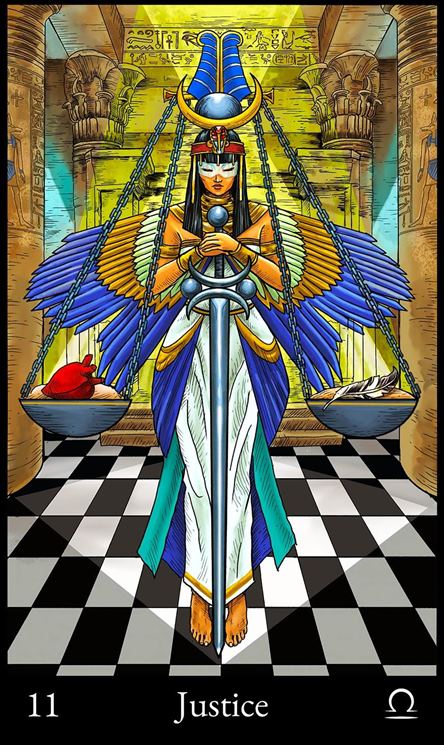
Until rapid, dependable means of
transportation and communication become
available to all, most dales and
other geographically isolated communities
will be self-contained, largely cut off
from the outer world. The fewer travelers,
the fewer new ideas — and the less
tolerance for differences from local ways
and beliefs. The spread of literacy will
also increase tolerance and weaken unthinking
belief in the old ways, but the
tenacity of superstitions is shown in our
own society by a great array of superstitious
sayings that, half-hidden, remain
today, along with the thinking that goes
with them. This can be illustrated by
such expressions as “There’s no harm in
trying,” which once meant literally that
— according to the beliefs of the speaker
(and the community) — there was nothing
wrong or dangerous about the act in
question.
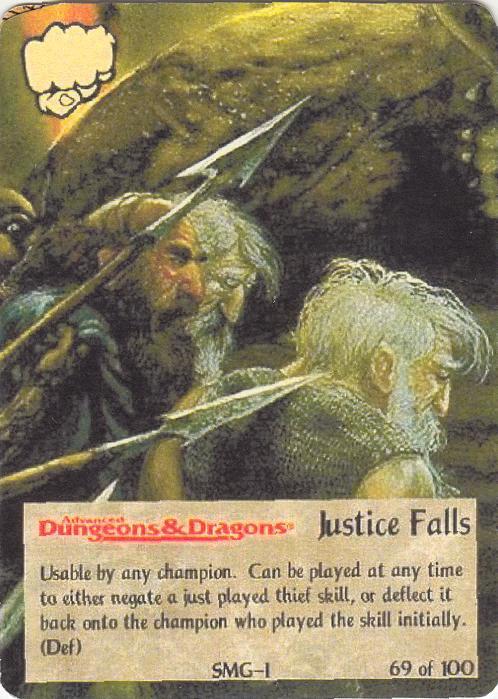
Many ancient rituals (such as Twelfth
Night fires, placing a cake upon the
horns of “the best ox in the stall” to
be
tossed in the air, and baking a hawthorn
globe each New Year while last year’s
globe was carried burning over the firstsown
wheat) were concerned with the
fertility of the farm. Ploughing and pulling
matches are two of the few such
customs that survive to this day. No matter
what the fantasy setting, where there
is agriculture there are sure to be rituals
for the best time to sow and to harvest
(such as with the phases of the moon, or
in concert with certain weather conditions
or natural changes like the opening
of certain blossoms), and rules to be followed
for avoiding death or ill luck and
for gaining good luck.
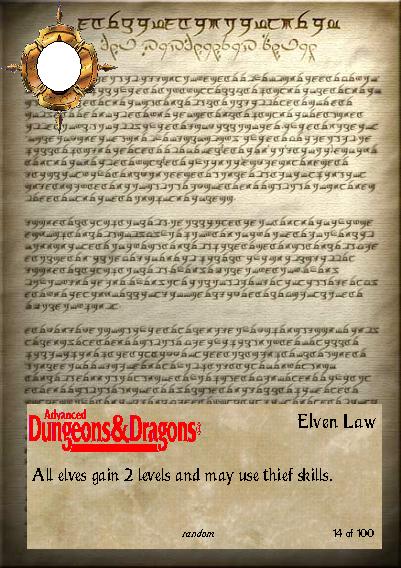
The DM, of course, must judge the accuracy
of such beliefs (such as “never
fell a tree by moonlight”) as far as the
party is concerned. Even if the beliefs
are
incorrect, the DM should remember that
they must at least be based on something
real or correct.
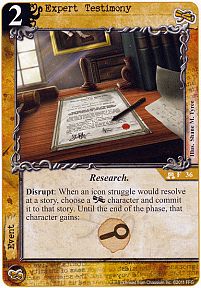
Such beliefs are not restricted to farmers.
Blacksmiths held that iron would not
weld when lightning was near, although
they set out troughs and barrels to catch
“storm water,” which they believed particularly
effective for tempering iron.
Countless other examples can be found.4

Note that local lore and the religious
situation will determine what form of government
is tolerated — and if government
is imposed by force, or becomes
unpopular after its establishment, how
well it will be obeyed. Locals may pay
only lip service to some laws and taxes,
or worse (does anyone remember the
Boston Tea Party?).

The support of the ruled (by accepted
custom and belief) lends stability to a
government. This in turn allows weak
rulers to keep their positions, at least
for
a time.
Most countries of any size, wealth and
influence have reached that condition by
the stability of popular (or at least,
accepted)
rule. In any land where communications
and travel are only as fast as a
good horse, the government must be
both strong and accepted by the populace
— or its rule will extend only as far
as the immediate reach of its weapons.
Raw power is, at best, an unstable
form of government (and just as shaky
for a legal system). It has a tendency
to
blow up in the ruler’s face — just ask
Robespierre.
Many types or structures of governments
exist, some of them quite noveI.5
DMs should also remember that the
“king” of Aluphin may command mighty
hosts of warriors and speak with authority
backed by gods, whereas the “king” of
the adjacent realm of Berdusk may be
only a war leader whose rule extends as
far as the swordpoints of his bodyguards.
Bruce Galloway, in his book Fantasy
Wargaming
(Cambridge, Patrick Stephens
Limited, 1981) reminds us that
this variance in real power among nobles
with the same title was true in our real
world, too:
English
kings were relatively
strong, except
during times of royal
minorities
and disputed succession.
They held
wide personal estates,
and maintained
the nucleus
of their own
standing army. A network
of royal officials
exercised
justice and
administration even
within the
lands of their nobles. By
contrast,
the French kings were
weak, little
more than primi inter
pares (“first
among equals”) in
comparison
with strong dukes and
counts. Germany
had what might
be considered
impossible — a
strong monarch,
but also dukes
and margraves
. . . akin to kings
themselves.
. . Italy, with its pattern
of city-states
and rural duchies owing
little or
no allegiance to any
monarch, needs
different treatment
again.
Whatever the actual balance of power
within a country and between different
countries — and remember, this is not
something set in stone by a DM to be
stable and unchanging forever; power
can and should shift constantly — those
who rule will control the citizenry (including
PCs) by means of laws.
Regardless of exactly what laws a DM
creates for his world, they will be broken
by player characters sooner or later (in
the AD&D world, usually sooner),
and
then — it’s punishment time.
The forms and aims of enforcement
are up to the DM, and must be tailored
to
match the other elements of society in
each local situation. For example, given
this imaginary example of law enforcement,
think on what it reveals of the society
of Zeluthin: In that city, political
prisoners are always strapped to their
cell doors, feet off the ground and facing
inwards into the darkness, so that the
backs of their heads are visible through
the barred cell doors. Punishment in Zeluthin
is a delicate art consisting of manipulation
of facial, head and neck muscles
with fingers and long, delicately
curved and fluted metal instruments —
from behind, through the cell door.
Strangulation is never employed; it is
the
height of coarse bad taste; but much information
is extracted by somewhat less
violent extremes — such as when hungry
rats are let in to the darkest corners
of
the cell.
Another city would find Zeluthin’s
habits disgusting or criminal; a DM must
carefully make government laws, local
religions and attitudes consistent.
Some general comments, however,
can be made as to how to handle local
enforcement forces and prisons — and
how not to handle them.
The discipline and training of local
guards/watch/militia/constabulary will
determine their reactions to any situation.
The better the training of the guards,
the more difficult will be the lot of adventurers
seeking to dupe or escape them.
Trained, experienced guards, for example,
will seldom be in awe of magic, and
will know effective tactics for when they
encounter spellcasters in battle. Experienced
guards will leave fewer avenues
for escape when confining persons —
and will take special care of extraordinary
individuals, such as adventurers. A
party may find itself stripped — clothes
can conceal, or even be, weapons — and
then chained securely to walls in separate
cells (in such a manner that movement
of hands and speech may be impossible)
and watched over carefully
(one to one) by guards who are relieved
often. Unknown to player character prisoners,
a magic-user may be spying on
them through use of Clairvoyance, Clairaudience,
ESP and related spells.
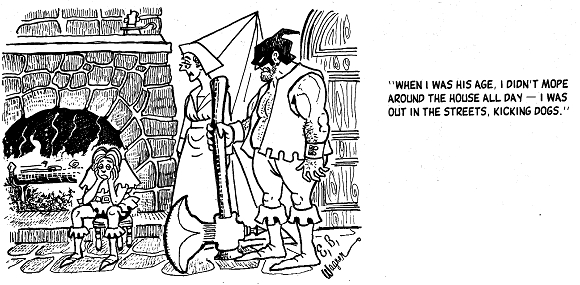
Guards with
good training and resources
may have monsters (war dogs, for
example) which are trained to aid them
in fighting intruders/rescuers or inmates
attempting to escape. Too many AD&D
adventures involve a party of player
characters sneaking and ambushing
their way through an unbelievably stupid
and unorganized defensive corps who
make no attempt at internal communication.
Slain or missing sentries go unnoticed,
and guard patrols walk past or
through treasures or areas they are supposed
to be guarding without routinely
examining their charges (so that party
members hiding in shadows, behind altars,
or in dark rooms are undetected).6
The discipline of a guard corps will
also determine its treatment of prisoners:
highly disciplined guards will act
according to rules, and will respect any
legal rights prisoners are considered to
have. Usually, confiscated goods will be
carefully itemized and stored (for return
when or if the prisoners are set free),
punishment of prisoners confined to a
special code, and prisoners will (at least)
be given food, water, and conditions of
confinement conducive to survival.7
Guards lacking such discipline may
do anything to prisoners they think they
can get away with — and in the case of
outlanders without apparent rank or influence,
this can include various means
of death-dealing, selling into slavery,
and all manner of theft.
Good characters (and players) who
are shocked at this tendency would do
well to remember that the essential difference
between a policeman and a pirate
is how they regard themselves, and
how they are regarded by the populace,
in relation to “rightful” authority (local
government). The actions of the two
types are often very similar.
Mention of the attitude and regard of
the populace brings us to the backbone
of local life and character; the evermoving
and changing, vital force behind
the laws, customs, and other elements:
politics. In the article “Plan
Before You
Play” (DRAGON™
issue #63), we looked
at politics on a large scale: the trade
links, tensions and history that shape
empires and denote wasteland and impoverished
areas, viewed broadly upon a
map.
But more important in AD&D play
is
the to-and-fro of local human interaction,
the politics of everyday life in a village
or a kingdom. A DRAGON reader
can refer to the previous Minarian
Legends
series or the currently running
World
of Greyhawk columns for excellent
examples of the large-scale politics
<(by Gary Gygax:
Dragon
#64)>
<(by Robert Kuntz:
Dragon
#63, Dragon #65)>
of fantasy worlds, but small-scale politics
(beyond Chaosium’s Thieves’
World,
which deals with the desert city Sanctuary)
is something each DM must devise
on his or her own.
Development of local politics will give
any campaign depth and believability,
and at the same time create reasons and
impetus for characters to undertake adventures
(and players to role-play). Make
a world seem real, so that what occurs
matters to the players, and you will make
play far more enjoyable and memorable
— and a DM owes it to his or her players
to give them an active, living world to
engage their interest, rather than a colorful
background of artificial, lifeless immobility
through which characters are
allowed to rampage.
This latter condition in a campaign
dooms play to eventual boredom, until
the playing activity ceases altogether.
If
the setting has no interest for the players,
no apparent life of its own, it must be
continually fed with the energy and excitement
of new characters and character
classes, new treasures, new monsters
and magic and traps . . . and when the
players grow jaded or the DM runs out of
ideas, the whole campaign runs down.
Even the gaudiest trappings cannot sustain
interest; one grows used to throne
rooms if one is a fighter in the party
that
conquers one kingdom after another,
just as one grows used to dark caverns
and locked chambers underground if
one lives like a mole, in an endless dungeon
with nothing to do but fight.
If a DM does not have the time or liking
for careful crafting of local politics,
history,
a cast of characters, and the like, a
simple solution is to sketch out the basic
history and geography of a region, and
begin play within its borders, in the midst
of a civil war.
The disorder, lawlessness, and intrigue
such a setting offers will get a party
off to
a good (exciting and offering wide experience
in fighting) start. Players should
be forced to take sides and become involved;
fantasy readers may recall the
excitement of Roger Zelazny’s 5-volume
Amber
series, which was primarily a
family struggle for control of a multiverse.
From such a rocky start, play can
shift into more conventional AD&D
territory,
perhaps with involvement in the intrigue
and politics of a large city with
warring guilds and the like and eventually,
when the successful, experienced
players seem ready for it, player characters
may have a crack at gaining control
of their own territory.
This territory should be small, so that
a
DM can concentrate on individual NPCs
to make the place seem real, and so
players can identify with their holding
— seeing it as a specific region with its
own character and beauty — and at the
same time seek to expand it. The DM
should also ensure that the players act
to
keep their lands, becoming involved in
trade and diplomacy as well as battle.
The notion that lands are a rosy source
of revenue, which novice players may
get from the Players Handbook (i.e.,
a
9th level
fighter who establishes a freehold
can automatically and effortlessly
collect 7 silver pieces per month from
“each and every inhabitant of the freehold
due to trade, tariffs, and taxes”),
must be quickly dispelled. Governing is
work, and a DM should see that those
who enjoy such work are happy in
their
thrones, and those who are not cannot
safely delegate the tasks of ruling to
others
if they wish to retain power for long.
Few medieval rulers were rich, in cash
terms, and fewer still spent most of the
taxes they collected on living high; rather,
most of a ruler’s money was needed
to cover military expenses (the training,
outfitting, boarding, and salaries of any
standing army, plus militia and/or mercenaries),
and the repair, expansion and
addition of ships, buildings, and fortifications.
Trade and the support of innovations
in industry and medicine are
other areas of expenditure a ruler should
keep in mind.
Even if a lord finds his subjects happy,
no priesthoods or guilds opposed to his
rule and no apparent problems, he can
always find something like this affixed
to
his castle door one morning:
To Doust Sulwood,
resident in
Shadowdale:
Recently I
have learned that you
have taken
the title, authority,
and lands
that are rightfully mine.
Shadowdale
has been my family’s
since the
death of the lord Joadath,
sixty winters
ago. I shall come for
my throne
ere spring. If you think
your claim
stronger than mine,
send word
back — or I shall come
with force
of arms to take back
what is mine.
Lord Lyran
of the family
Nanther,
Melvaunt
This sample letter is from my campaign;
the players do not (yet) know
whether “Lord Lyran” is a pretender or
a
legitimate claimant to the lordship of
Shadowdale (local history is incomplete
and contradictory on the subject). A
quick look at Doust Sulwood, the Lord of
Shadowdale (a PC), and
his plateful of problems will demonstrate
the depth, excitement, and constant adventures
generated in a campaign by local
society and politics.
Doust Sulwood is lord of a farming
community surrounded and largely isolated
by elven-inhabited woods. It is a
stop on a major overland trade road, and
has successful, if unspectacular, local
industry (a weaver, a smith, a wagonmaker/
woodworker, and of course an
inn). Doust has a few local problems:
collecting taxes (the dalefolk had been
without a lord or taxes for some years
before his arrival), settling local feuds
and ferreting out a lycanthrope among
the townsfolk, and dealing with incumbent
power groups: a band of adventurers
(all more powerful than the players,
and used to being the local champions
and heroes); the Circle (a group of druids
and rangers who work with the elves to
preserve the forest against fire and farm
expansion); and a few powerful solitary
NPCs who could topple his lordship if
they decided against him. All of these
power groups have their own interests,
and all of the them have more personal
power than the Lord and his party. Both
the elves and the druids have (PC) representatives/spies
in the
party.

From outside the dale there are influences
too. Many nearby rulers and priesthoods
have, or are about to, send envoys
to Lord Doust, seeking (nay, demanding
and often bribing or threatening) alliances,
allowances of free trade and the
powers to establish temples and tithe the
populace. At least two dale lords are eyeing
Shadowdale as a possible addition to
their own lands — and the player characters
have made special enemies of a secretive
network of evil mages and clerics
who wish to control all overland trade
between the rich coastal cities and the
lands about the Inland Sea. Shadowdale
occupies a strategic location on the caravan
route, and the party has — at first
unwittingly, and then in careful selfdefense
— slain many members of this
evil “network.” Party members have also
died in the running battle, and with the
spring thaws their surviving comrades
may face a network-sponsored army invading
the dale. At the same time, the
drow — now apparently allied with some
githyanki — seem to be stirring in the
depths. Lord Doust’s tower was built by
the drow, and it once guarded the entrances
to their vast subterranean realms.
The dark elves were driven into the
depths over a hundred winters ago, and
the exits were blocked. Now they seem
to be returning, and have kidnapped one
of the dalefolk (which the party subsequently
rescued) to learn details of society
and property in the dale.
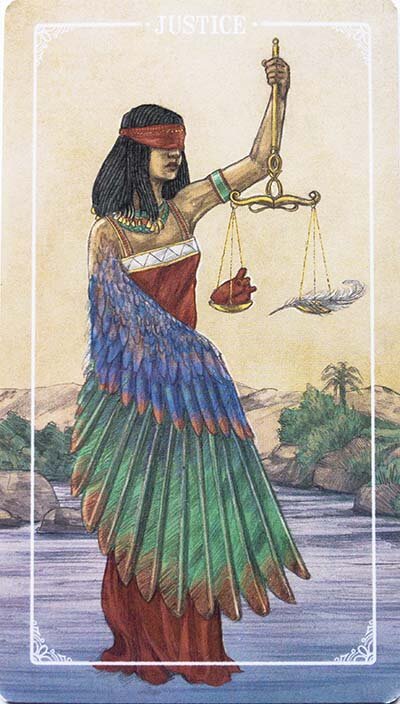
To Doust’s ears also comes a constant
flow of news about current events, coming
to Shadowdale via caravan, and the
party can learn much of movements and
political actions by careful attention
to
and interpretation of the “current news
daleside.”
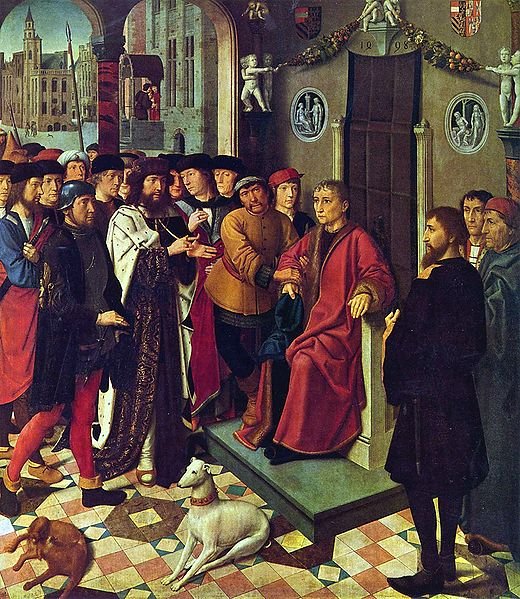
All of the aforementioned conflicts
and challenges come to the party, made
up of characters with personal problems
and interests of their own. In Lord Doust’s
case, he is a cleric of Tyche, the goddess
of luck, who wants her followers to lead
daring, chancy lives. This was an easy
creed to follow when Doust was a landless
adventurer; but now, when he wishes
to build his strength and act with caution
and deliberation in the face of all these
dangers and demands, he finds himself
torn between Tyche’s dictates (which he
must follow if he expects the goddess to
grant him spells, and if he wishes to rise
in her service; that is, gain levels) and
his
own enjoyment of adventure, and the
necessary prudence of a ruler in such a
delicate and dangerous situation.
Such playing conditions make for excitement
and good role-playing. Players
are interested in the campaign because
every adventure becomes (through cause
and effect) important, not just in terms
of
treasure and experience gained, but in
terms of social consequences. Moreover,
with such a lot going on, the interaction
of players and NPCs generates adventures;
there is always something
meaningful to do. This sense of purpose
serves to sustain interest over lengthy
campaign play, makes the fantasy setting
seem more real, and makes successful
play more satisfying: Players gain a
real sense of accomplishment when they
complete sticky diplomatic negotiations,
gain allies, find a path through intrigue,
or destroy long-standing foes. And in
this increased enjoyment of play lies the
real value of such an approach to the
AD&D game.
It may seem odd to increase the enjoyment
of fantasy role-playing by increasing
the problems and difficulties of
the setting (so that it seems you’re not
many DMs use a world in play — and
such overmanipulation quickly sours
players who feel that, rather than playing
the roles of adventurers, they are portraying
helpless pawns at the mercy of a
vindictive god. DMs who believe that this
is precisely how players should feel will
probably have stopped reading this article
long ago. DMs who find enjoyment in
creating a fantasy world they can share
and delight in with other people will,
I
hope, find what has been said here
useful.
________________________________
. . . the escalation of
treasure, monsters and
character experience
will ruin a campaign . .
.
a world requires careful
attention to NPC
activity, so that player
characters are not the
only source of action in
an otherwise lifeless
backdrop.
__________________________________
1 — H.P.
Lovecraft,
The Dream-Quest
of Unknown Kadath,
published in paperback
by Ballantine, 1970 (and recently
reprinted), p. 8. A similar law is in effect
in Rome today.
2 — The strength of such
beliefs as a
code of behavior is illustrated by a Latin
phrase known in modern legal practice:
Multa non vetat lex, quae tamen
tacite
damnavit,
which translates to “Some
things are not forbidden that are nonetheless
silently condemned.”
3 — In his excellent study
of fantasy,
Imaginary Worlds
(Ballantine, 1973), Lin
Carter reports one of master fantasy writer
Lord Dunsany’s touches of realism:
the human nature displayed by the archers
of Tor, who shoot arrows of ivory
at strangers, lest any foreigner should
come to change their laws — which are
bad laws, but not to be altered by mere
foreigners. Another chapter in Imaginary
Worlds,
entitled “On World-Making,” is
essential reading for DMs who have not
extensively explored fantasy literature.
Carter discusses the “sound” and suitability
of fantastic names, as well as providing
a fast, logical geography lesson.
4 — On the shelves of most
libraries
one can find books dealing with local
customs and tradition. One example is
Folklore and Customs of Rural
England
(by Margaret Baker; London, David &
Charles [Holdings] Limited, 1974), which
is chock full of readily usable local lore
— but there are many similar sources.
5 — For types
of government, refer to
the DMG and D&D® module
X-1,
The
Isle of Dread,
and to L. Sprague de
Camp’s The
Goblin Tower (New York,
Pyramid Books, 1968) and its sequel,
The Clocks
of Iraz.
6 — Movie buffs may recall
the scenes
in Monty Python’s Life
of Brian in which
at least a dozen Roman guards repeatedly
search a small set of apartments without
detecting the Judean resistance
fighters, who stand behind tapestries,
crawl under the tables, and dive into
wicker baskets in attempts to hide — and
of course remain in full view all the time.
7 — These will include light,
ventilation,
sanitary facilities, the dignity of prison
clothing or the right to retain one’s
own clothing, acceptable or even comfortable
temperatures, and a relatively
quiet, odor-free environment.